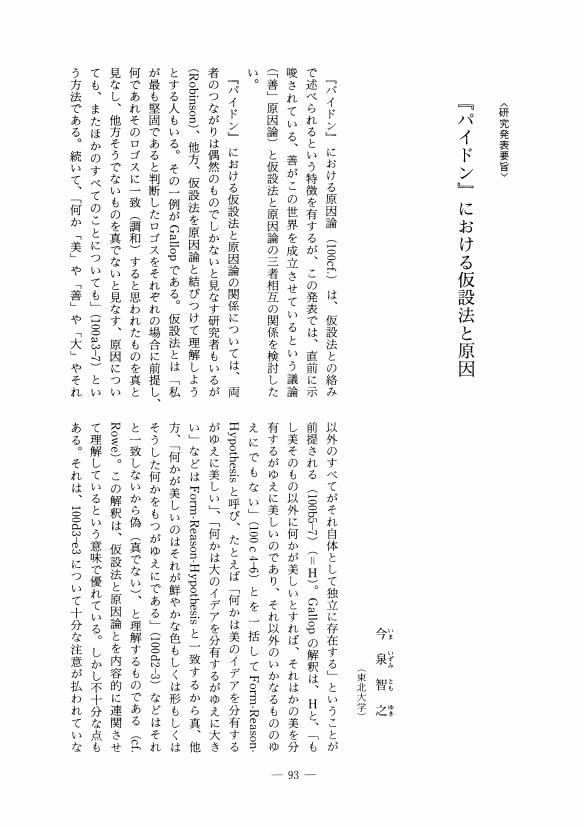2 0 0 0 「かわいそう」という感情をめぐって
- 著者
- 田村 京子
- 出版者
- 日本医学哲学・倫理学会
- 雑誌
- 医学哲学医学倫理 (ISSN:02896427)
- 巻号頁・発行日
- no.17, pp.123-132, 1999-10-01
With regard to the social welfare of disabled persons, I will consider the relationship between feelings of pity for them and discrimination against them. In Japan, most people today who have not been in close contact with disabled persons feel pity for them. Is this feeling of pity an expression of discrimination against them? In this paper, I will describe and analyze the nature of this feeling and make the following points: 1) A feeling is experienced passively, so we cannot modify it at the same time that we are feeling it. Therfore, feelings of pity for disabled persons are not in themselves equivalent to discrimination against them. It is possible to interpret them as such, but this interpretation only presents discrimination as a problem without a solution. 2) Referring to Arbert Memmi's definition of discrimination in context of racism, I will consider the way in which discrimination is the result of a relationship between individuals and society. Discrimination shuld be understood at the social level, namely in its relationship to social structure and social organization. Only then can we find measures to resolve it. 3) Pity for persons with disabilities is no more than a groundless conviction held by non-disabled persons, and is a reflection of the lack of communication between these two groups. 4) We should start from the fact that people, both with and without disabilities live in the same world at the same time, and thus learn to naturally accept heterogeneuty and variety in people.
1 0 0 0 OA 医療安全管理者としての医師と看護師 ―自由記載からみた問題意識の相異―
- 著者
- 加藤 英一 田村 京子
- 出版者
- 東北社会学会
- 雑誌
- 社会学年報 (ISSN:02873133)
- 巻号頁・発行日
- vol.39, pp.87-97, 2010-07-16 (Released:2014-02-07)
- 参考文献数
- 41
医療安全管理者は,看護師,医師,薬剤師といった複数の異なった医療資格者によって担われている.但し,この中でも医師と看護師の占める割合が特に大きい.本稿は医療安全管理者が,日常の業務の中で抱いている問題点の分析という観点から,異なった医療資格者間の中でも,医師と看護師における安全業務に対する問題意識の相異を調査を通して明らかにしている. 結果として,同じ医療安全管理者でありながらも,異なった医師と看護師とでは異なった問題意識を抱いていることが明らかとなった.医師は医療安全業務に対して,その問題の本質は社会や国のレベルにあると捉えているがゆえに,「国レベルの問題」に対して関心を抱く傾向にあり,他方看護師は医療安全業務を身近な組織の問題として捉えているがゆえに,「病院組織内の問題」に対してよりその関心を抱く傾向にある.
1 0 0 0 OA 小児腎移植における倫理的要件と医療者の責務
- 著者
- 田村 京子
- 出版者
- 日本医学哲学・倫理学会
- 雑誌
- 医学哲学 医学倫理 (ISSN:02896427)
- 巻号頁・発行日
- vol.37, pp.14-23, 2019 (Released:2022-07-20)
1 0 0 0 OA 医療組織の倫理的課題としての「信頼」について : エラーを通して考える
- 著者
- 田村 京子
- 出版者
- 日本医学哲学・倫理学会
- 雑誌
- 医学哲学 医学倫理 (ISSN:02896427)
- 巻号頁・発行日
- vol.26, pp.11-20, 2008-10-22 (Released:2018-02-01)
All individuals would like to receive competent and safe medical care and treatment from caregivers whom they trust. However, some recent medical accidents that have been published have resulted in a loss of trust in medical caregivers. This paper examines the trust between a patient and his/her caregiver with reference to medical errors, considers from the following respects. 1. When a person suffers an unexpected adverse outcome of treatment, he/she expects his/her medical caregiver to have a faithful attitude toward him/her. In particular, he/she expects the caregiver to be completely honest and clearly explain the effects of the treatment given to him/her and whether his/her condition could deteriorate. I believe that medical caregivers are responsible for informing patients who have suffered adverse outcomes of treatment. This is based on the ethical principles of doing no harm and respecting the patient's right to know. 2. Medical errors may occur because a substantial number of medical treatments involve high risks. Moreover, errors may also result due to organizational factors. 3. In Japan, large hospitals, where medical errors may frequently occur, have begun to investigate and examine the causes of such errors to reduce their occurrence and to improve patient safety. However, it appears that little attention is being given to policies concerning the disclosure of such errors. 4. All healthcare organizations should establish a strong, proactive policy to support individuals who have suffered errors in treatment by completely and honestly disclosing such errors to patients. If healthcare organizations do not support individual patients, they are not being honest with them. Moreover, ethical support from organizations may protect individuals from the shame, guilt, fear, and loneliness that they may experience.
1 0 0 0 OA 全国歯科大学・大学歯学部倫理委員会についての実態調査報告
- 著者
- 田村 京子
- 出版者
- 日本医学哲学・倫理学会
- 雑誌
- 医学哲学 医学倫理 (ISSN:02896427)
- 巻号頁・発行日
- vol.24, pp.64-74, 2006-10-24 (Released:2018-02-01)
In July 2005, I investigated the conditions of the dental ethics committees of 29 universities and dental colleges in Japan. Of these, 16 responded to questions sent to them. In this report, I consider the problems pertaining to these dental ethics committees. Some committees are composed of members who are either dental specialists, or dental specialists and natural scientists. However, according to the criteria of the guidelines drafted by the Board of Bioethics and Security of the Ministry of Education, Culture, Sports, Science, and Technology, there must be at least one external member and one female member on each such committees. In response to the question concerning the ethical problems involved in the process of review of dental research conducted on human subjects, these committees stated that they have almost no such problems. I suspect that the committees' members are unfamiliar with eminent declarations such as, the WMA Declaration of Helsinki and other guidelines, and are not sensitive to ethical issues,; therefore, their review process is thus probably not fair. Such committees also appear insensitive to the ethics of dental education, since they do not provide guidance to students in collecting extracted teeth with informed consent. On the other hand, the ethics committees that follow the criteria of guidelines are sensitive to internal issues, e.g., how the committees are authorized and what qualities are required of members. There is thus a gap in quality among committees. However, this investigation does not clarify the sorts of problems that should be considered ethical. An increase in review of ethical committees is expected. I believe that it is important for such committees to communicate with eath other in clarifying ethical issues, eliminate the gap in quality among committees, and adequately consider their authority and obligations as well as, the requirements concerning the qualities of their members.
1 0 0 0 OA 性/ジェンダー/セクシュアリティ(ワークショップの概要)
- 著者
- 田村 京子
- 出版者
- 日本医学哲学・倫理学会
- 雑誌
- 医学哲学 医学倫理 (ISSN:02896427)
- 巻号頁・発行日
- vol.22, pp.123-126, 2004-10-18 (Released:2018-02-01)
1 0 0 0 OA 臓器提供病院から見た脳死移植問題
- 著者
- 田村 京子
- 出版者
- 日本医学哲学・倫理学会
- 雑誌
- 医学哲学 医学倫理 (ISSN:02896427)
- 巻号頁・発行日
- vol.20, pp.1-15, 2002-11-10 (Released:2018-02-01)
Since the "Law of Organ Transplant" was enacted in 1997, transplants of organs from brain-dead patients have been performed in Japan. I interviewed physicians working for a hospital providing organs from brain-dead patients. The results are reported here. The discussion points are as follows: 1: There are four specific physician related roles to be found in the process of extracting organs from a brain-dead patient, as follows: A physician engaged in life saving (Physician for emergency), two physicians who diagnose brain death (Neuro internal physician and neurosurgeon), two physicians who manage a donor (Anesthetists), and two physicians supporting the extraction (Anesthetists). 2: The physicians had different opinions depending on their role. In particular, the anesthetists in charge of donor management felt that good quality medical treatment was not being provided, since the medical conduct was only the same as that for ordinary patients in the Department of Anesthesiology. 3: The anesthetists really felt that death occurred upon the extraction of the heart of the brain-dead patient. 4: Because the provision of an organ in an organ providing hospital is conducted under a division system, and feedback from a transplant hospital to an organ providing hospital is not conducted, physicians from the organ providing hospital could not understand the conditions of the recipient and could thus not evaluate transplants from the braindead patient. 5: Because observance of the law is more important than medical conduct, physicians don't need to ask questions about treatment that concern them.
1 0 0 0 OA 「かわいそう」という感情をめぐって
- 著者
- 田村 京子
- 出版者
- 日本医学哲学・倫理学会
- 雑誌
- 医学哲学 医学倫理 (ISSN:02896427)
- 巻号頁・発行日
- vol.17, pp.123-132, 1999-10-01 (Released:2018-02-01)
With regard to the social welfare of disabled persons, I will consider the relationship between feelings of pity for them and discrimination against them. In Japan, most people today who have not been in close contact with disabled persons feel pity for them. Is this feeling of pity an expression of discrimination against them? In this paper, I will describe and analyze the nature of this feeling and make the following points: 1) A feeling is experienced passively, so we cannot modify it at the same time that we are feeling it. Therfore, feelings of pity for disabled persons are not in themselves equivalent to discrimination against them. It is possible to interpret them as such, but this interpretation only presents discrimination as a problem without a solution. 2) Referring to Arbert Memmi's definition of discrimination in context of racism, I will consider the way in which discrimination is the result of a relationship between individuals and society. Discrimination shuld be understood at the social level, namely in its relationship to social structure and social organization. Only then can we find measures to resolve it. 3) Pity for persons with disabilities is no more than a groundless conviction held by non-disabled persons, and is a reflection of the lack of communication between these two groups. 4) We should start from the fact that people, both with and without disabilities live in the same world at the same time, and thus learn to naturally accept heterogeneuty and variety in people.
1 0 0 0 OA 研究発表要旨
1 0 0 0 受動的綜合の分析
- 著者
- エドムント・フッサール著 山口一郎 田村京子訳
- 出版者
- 国文社
- 巻号頁・発行日
- 1997



